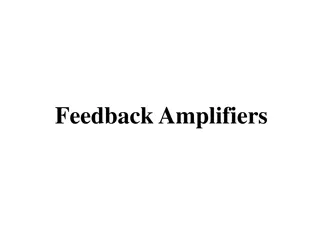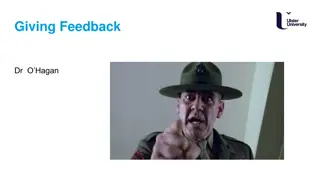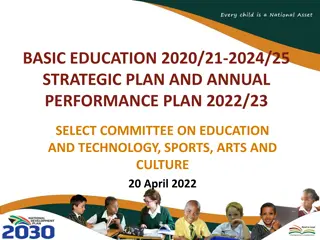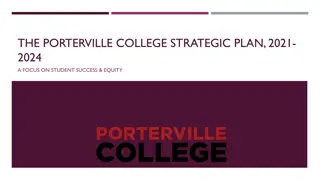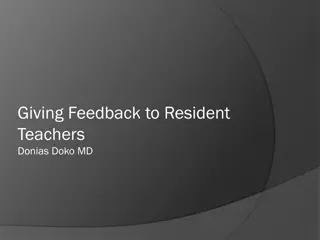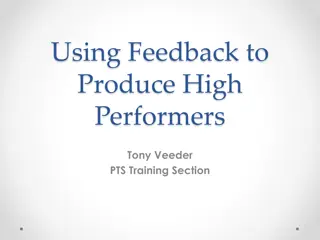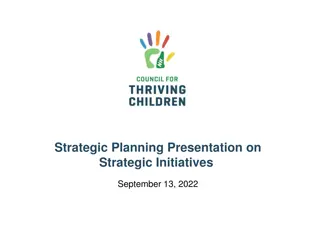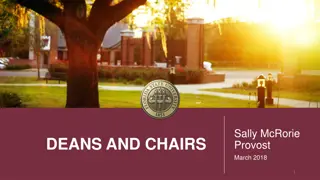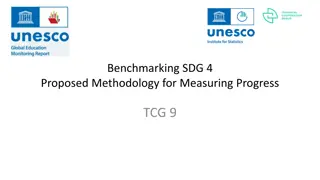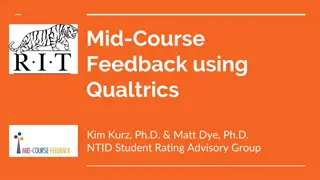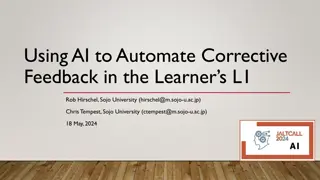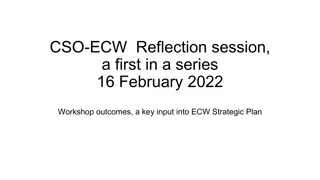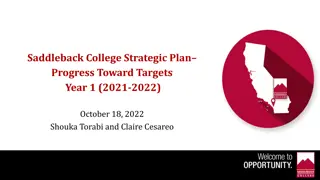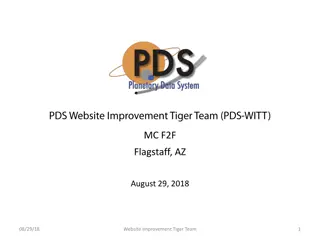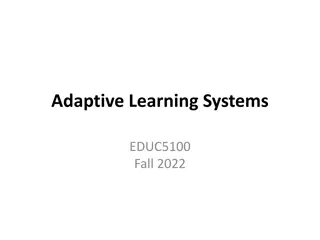Overview of Ministry of Education's Education Strategic Plan Feedback and Progress
The Ministry of Education in Jordan is actively seeking feedback and incorporating accomplishments into the Education Strategic Plan. Various sources of feedback, such as reports, evaluations, and studies, are being utilized to enhance the education system. Efforts are being made to improve gender mainstreaming in key indicators. Committees are evaluating progress and making necessary adjustments to reports. The Ministry is committed to continuous improvement and collaboration with partners for the successful implementation of the plan.
Download Presentation

Please find below an Image/Link to download the presentation.
The content on the website is provided AS IS for your information and personal use only. It may not be sold, licensed, or shared on other websites without obtaining consent from the author.If you encounter any issues during the download, it is possible that the publisher has removed the file from their server.
You are allowed to download the files provided on this website for personal or commercial use, subject to the condition that they are used lawfully. All files are the property of their respective owners.
The content on the website is provided AS IS for your information and personal use only. It may not be sold, licensed, or shared on other websites without obtaining consent from the author.
E N D
Presentation Transcript
2019 Overview on the ESP April 2019 1
Introduction Currently, the Ministry of Education is following the achieved accomplishments of the Education Strategic Plan (ESP) 2018- 2022. Furthermore MoE endeavors to develop its works through feedback on the requirements of the stage and developments on the level of the education system in Jordan. The most important sources of feedback: Recommendations of Country Report on the state of the Public Education Sector. Government action priorities for 2018-2020 Financial analysis of ESP domains. Improvement Plan of MoE - Eighth Session / Strategy Standard. MoE's executive action plan of 2019. Feedback related to the annual review of the Monitoring and Evaluation Report on Education Strategic Plan for 2018 Indicators cards for key indicators Feedback concerning the annual review of (ESP) provided by supporters and donors. Results of internal and external evaluation reports and studies All comments and notices stated in reports were included as well as the specification of MDs' response in the MoE regarding these comments and notices along with defining suggested solutions and accomplishment period. . 2022 - 2018 . 2020 - 2018 . / - . 2019 2018 . . 2
2018 . Overview of education partners comments on the ESP 2018 progress report, MoE response, and next steps for finalizationand public release of the report on the MoE website Overview of the comments received and the MoE's response including how this will/will not be incorporated in the final report As for the feedback provided by partners and supporters and with close and direct follow up from HE the General Secretary for Administrative & Financial Affairs the following actions were carried out: Evaluation and follow-up committees according to the ESP domains. Committees were provided with feedback (reports and discussions), to enable the Committees to provide feedback to the concerned managing directorates (MDs) and to evaluate the accomplishments made in the first quarter of 2019. In light these accomplishments, the 2018 report will be amended to take them into account in drafting monitoring and evaluation reports. . : were restructured 2019 2018 . 3
There is a scope for more gender mainstreaming in some indicators. The entity responsible recommendation should be clearly stated. . . for carrying the As for the gender indicators which are among the most important issues that intersect with all domains of the ESP, the availability of data in the main and sub- indicators will be ascertained according to sex and details that show the real achievement of the indicator and the identification and follow-up of all the recommendations of the report through the Division of Monitoring & Evaluation, joint committees to follow up the ESP, which was recently formed within the indicator card. 4
The ESP should more clearly be used to steer the activities of the different donors (who is supporting which KPI) and should include a time financing/price tag. . ) ( frame and/or / / The MoE has identified the responsibilities and sources of information for all indicators according to the domains of the ESP and indicators cards, the concerned MDs as well as directing the support within the ESP. It is possible for partners and supporters to include of indicators in a clearer way to focus on achieving the indicators with a more accurate identification of the key and sub indicators. According to implementation mechanism to implementation joint internally and externally. determine responsibilities the of 5
Construction costs, the speed of implementation and methodology needs more elaboration. Follow- up on ESP implementation continues to be necessary. A chapter on stakeholders could be added (community, schools, parents groups, NGOs) and their role in implementation stated. . . ) ( . The concerned MDs and teams are working on including the required operational plans of components which have been developed and will focus on these plans to include all executive procedures as well as implementing partners to be approved at all levels. budgets within the All implementation Furthermore, more focus will be placed on the implementation of all priorities concerning many issues such as Tawjihi exam, as well as the alignment with sectoral plans such as the new strategy prepared by the Higher Council for the Rights of Persons with Disabilities. main subjects listed in will ESP as well examined. as priorities be 6
Tawjihi Exam Center is a priority for MoE, nevertheless, it was not mentioned. A comprehensive plan has been developed for the establishment of electronic exam centers for general secondary in all regions of the Kingdom; the plan examination for approval. is currently under Share next steps on formal MoE approval and public release of the report 6 2019 The M&E link on the MoE's website will be updated and all reports and achievements will be published according to the evaluation stages in Arabic and English by the end of the June 2019. 7
Recommendations . ) . ( ESP / ( ESP ) ( " We would encourage the MoE to include a financial review/update as it relates to the implementation of the ESP, as part of the annual reports and annual review meetings. A financial review/update could include information on the costs of implementing the ESP for the given year, the time frame, the amount of resources allocated to each domain and the financial gaps. This would help the MoE to plan according to the resources available (both internal and external) and could potentially help the MoE to secure additional funding by providing a strong investment case which includes a clear picture of the remaining gaps. ) / " ) A general financial analysis has been included according to the financial estimates for the ESP domains. Emphasis will be placed on executive plans to include the cost and allocations to identify financing gaps and preparation of future reports (semi-annual and annual reports) by achievements or realization of indicators, provisions, budgets, financing gaps, financial analysis necessary to implement planned activities. ( . along with specifying 8
Recommendations / . . For each domain and in addition to the data reported on each KPI, we would encourage the MoE to include findings of relevant assessments, studies and evaluations that were completed during the year of implementation. interesting qualitative data/information to assess the progress under each of the domains. This would provide The Ministry has been working on developing the general framework for monitoring and evaluation which includes the results of evaluation reports as well as the addition of other indicators stated in the ESP and make use recommendations of these major internal and external evaluative studies. Furthermore, it will be a good opportunity to include evaluation results and studies within the main plan as well as executive plans which will support the achievement of indicators and in defining the necessary dates to carry out these studies so as to benefit from their results and recommendations. of the results and 9
The next steps for Monitoring & Evaluation Processes Developing monitoring and evaluation reports continuously to achieve a comprehensive and integrated overall monitoring and evaluation framework with key and sub performance indicators for all current projects. Ensuring adequate classification and comprehensiveness in coverage of all required data and identify additional data that should be included for future measurements such as disaggregation by gender, challenges, etc. Developing some key indicators and sub-indicators that need to be reclassified, developed and adopted, and data and measurement mechanisms are included to ensure the achievement of the indicators within the approved indicators cards, specifying the responsibilitiesfor each key and sub-indicator. Focusing on the executive plans to include all objectives, procedures and budgets for the strategic plan projects and evaluating them periodicallythrough the sub-indicatorsadopted in the ESP. Including the executive plans of the ESP on all the data, sub- indicators and budgets necessary to define achieved progress with the development of additional objectives and indicators of projects for the unspecified activities implementationof the ESP. Including the results and recommendations of studies and evaluations within the main plan and executive plans and making use of the resultsand recommendationsof these studies. Including the amendments and findings taken from the evaluation reports for approval throughMDs, supporters and partners. Defining the mechanisms and responsibilities of measurement and follow-up through the use of indicators cards method adopted by all concerned MD and joint committees. Aligning all development projects implemented on the MoE's level through indicators which are included in the follow-up and evaluation reports, including those carried out in coordination with partners and donors so that the report will cover all aspects of developmentat the MoE'slevel. . that support the optimal 11
Structuring of partnerships and coordination for the ESP Special Committees of Monitoring and Evaluation were formed according to ESP. : Higher Steering Committee Policy , Planning and Coordination Body Technical Work Teams 12
Financial Analysis (In JOD Thousands) 2018 (In JOD Thousands) 2019 Cumulativ e Gap 2018+2019Notices % of % of Key & Sub-Components Cost 2018 Cost 2019 Financing Gap 2019 Allocations 2018 Financing Gap Allocations 2019 allocations out of Cost 2018 allocation s out of Cost 2019 1- Early Education & Childhood Development Access and Expansion Quality of (EECD) 12,853 1,355 10.5% 11,498 13,664 2,186 16.0% 11,478 22,976 9,811 3,042 1,255 100 12.8% 3.3% 8,556 2,942 9,858 3,806 1,886 300 19.1% 7.9% 7,972 3,506 16,528 6,448 Component I: Early Education & Childhood Development The table above indicates that the total actual cost of this component is (JOD 12.853 million) during 2018 as stated in the ESP and only (JOD 1.355million) was allocated in the MoE's budget law during the same year i.e., (10.5%) and the financing gap of this component is (JOD 11.498 million) while during this year 2019, the gap will be (84%). 17
Financial Analysis (In JOD Thousands) 2018 (In JOD Thousands) 2019 Cumulative Gap 2018+2019 Key & Sub- Components % of % of Notices Cost 2018 Cost 2019 Financing Gap 2019 Allocations 2018 Financing Gap Allocations 2019 allocations out of Cost 2018 26.4% allocations out of Cost 2019 32.4% 2- Access & Equity 276,918 73,014 203,904 280,932 91,065 189,867 393,771 Ministry of Planning Infrastructure 256,252 42,569 16.6% 213,683 256,252 86,519 33.8% 169,733 383,416 Inclusive Education & Special Education Lifelong Learning & Non-formal Education 10,406 3,875 37.2% 6,531 15,143 3,976 26.3% 11,167 17,698 2,824 570 20.2% 2,254 3,121 570 18.3% 2,551 4,805 Ministry of Finance Refugees 7,436 26,000 349.7% 18,564- 6,416 0 0.0% 6,416 12,148- Component II: Access & Equity The table above indicates that the total actual cost of this component is (JOD 276.918 million) during 2018 as stated in the ESP and only (JOD 73.014 million) was allocated in the MoE's budget law during the same year i.e., (26.4%) and the financing gap of this component is (JOD 203.904 million) while during this year 2019, the gap will be (67.6%). 18
Financial Analysis (In JOD Thousands) 2018 (In JOD Thousands) 2019 Cumulative Gap 2018+2019 % of % of Key & Sub-Components Notices Cost 2018 Cost 2019 Financing Gap 2019 Allocations 2018 Financing Gap Allocations 2019 allocations out of Cost 2018 1.5% allocations out of Cost 2019 2.9% 3- System Strengthening Institutional Performance Management Management of Educational Information Systems Crises & Risks Management 7,765 115 7,650 7,916 230 7,686 15,336 2,247 0 0.0% 2,247 2,328 0 0.0% 2,328 4,575 5,500 105 1.9% 5,395 5,500 220 4.0% 5,280 10,675 18 10 55.6% 8 88 10 11.4% 78 86 Lore Tax Component III: System Strengthening The table above indicates that the total actual cost of this component is (JOD 7.765 million) during 2018 as stated in the ESP and only (JOD 115 thousand) was allocated in the MoE's budget law during the same year i.e., (1.5%) and the financing gap of this component is (JOD 7.650million) while during this year 2019, the gap will be (97.1%). 19
Financial Analysis (In JOD Thousands) 2018 (In JOD Thousands) 2019 Cumulative Gap 2018+2019 Key & Sub- Components % of % of Notices Cost 2018 Cost 2019 Financing Gap 2019 Allocations 2018 Financing Gap Allocations 2019 allocations out of Cost 2018 30.5% allocations out of Cost 2019 32.1% 4- Quality Curriculum & Assessment Information & communication technology (ITC) in education School leadership and community participation Accountability, auditing (Education Quality & Accountability Unit) Safe & stimulating school environment 90,848 27,709 63,139 87,163 27,964 59,199 122,338 16,324 17,111 104.8% 787- 16,186 17,283 106.8% 1,097- 1,884- 25,405 3,698 14.6% 21,707 23,875 3,556 14.9% 20,319 42,026 0.000 0.000 0% 0 0 0 0.0% 0 - 6,426 175 2.7% 6,251 5,255 400 7.6% 4,855 11,106 42,693 6,725 15.8% 35,968 41,847 6,725 16.1% 35,122 71,090 Component IV: Quality The table above indicates that the total actual cost of this component is (JOD 90.848 million) during 2018 as stated in the ESP and only (JOD 27.709million) was allocated in the MoE's budget law during the same year i.e., (30.5%) and the financing gap of this component is (JOD 63.139 million) while during this year 2019, the gap will be (67.9%). 20
Financial Analysis (In JOD Thousands) 2018 (In JOD Thousands) 2019 Cumulative Gap 2018+2019 % of % of Key & Sub-Components Notices Cost 2018 Cost 2019 Financing Gap 2019 Allocations 2018 Financing Gap Allocations 2019 allocations out of Cost 2018 3.9% allocations out of Cost 2019 63.8% 5- Human Resources Selection, Recruitment & Pre-service Qualification of Teachers Selection & Development of Leadership at Administrative Levels In- service Professional Development & Teacher Licensing Teachers Rewards &Incentives Monitoring, Evaluation & Quality Control of Teacher Policies 40,128 1,548 38,581 12,659 8,071 4,588 43,169 40,080 1,520 3.8% 8,560 12,599 8,006 63.5% 4,593 43,153 18 7.5 41.7% 11 0 0 0% 0 11 30 20 66.7% 10 60 65 108.3% 5- 5 Component V: Human Resources The table above indicates that the total actual cost of this component is (JOD 40.128 million) during 2018 as stated in the ESP and only (JOD 1.548 million) was allocated in the MoE's budget law during the same year i.e., (3.9%) and the financing gap of this component is (JOD 38.581 million) while during this year 2019, the gap will be (36.2%). 21
Financial Analysis (In JOD Thousands) 2018 (In JOD Thousands) 2019 Cumulative Gap 2018+2019 % of % of Key & Sub-Components Notices Cost 2018 Cost 2019 Financing Gap 2019 Allocations 2018 Financing Gap Allocations 2019 allocations out of Cost 2018 7.4% 0% 5.3% 25.2% allocations out of Cost 2019 8.4% 0% 9.9% 4.0% 6- Vocational Education Improving Management Increasing Access Improving Quality 19,009 1,569 15,080 2,360 1,400 0 805 595 17,609 1,569 14,275 2,765 18,924 1,494 15,070 2,360 1,590 0 1,495 95 17,334 1,494 13,575 2,265 34,943 3,063 27,850 4,030 Component VI: Vocational Education The table above indicates that the total actual cost of this component is (JOD 19.009 million) during 2018 as stated in the ESP and only (JOD 1.400 million) was allocated in the MoE's budget law during the same year i.e., (92.64%) and the financing gap of this component is (JOD 17.609 million) while during this year 2019, the gap will be (91.6%). 22
Financial Analysis (In JOD Thousands) 2018 (In JOD Thousands) 2019 Cumulative Gap 2018+2019 Key & Sub- Components % of % of Notices Cost 2018 Cost 2019 Financing Gap 2019 Allocations 2018 Financing Gap Allocations 2019 allocations out of Cost 2018 allocations out of Cost 2019 Grand Total 447,521 105,141 23.5% 342,381 421,258 131,106 31.1% 290,152 632,533 23
Financial Analysis (In JOD Thousands) 2018 (In JOD Thousands) 2019 Cumulative Gap 2018+2019 % of % of Key Components Cost 2018 Cost 2019 Financing Gap 2019 allocation s out of Cost 2018 allocation s out of Cost 2019 Allocations 2018 Financing Gap Allocations 2019 1- Early Education & Childhood Development 12,853 1,355 10.5% 11,498 13,664 2186 16.0% 11,478 22,976 2- Access & Equity 276,918 73,014 26.4% 203,904 280,932 91,065 32.4% 393,771 189,867.0 3- System Strengthening 7,765 115 1.5% 7,650 7,916 230 2.9% 7,686 15,336 4- Quality 90,848 27,709 30.5% 63,139 87,163 27,964 32.1% 59,199 122,338 5- Human Resources 40,128 1,548 3.9% 38,581 12,659 8,071 63.8% 4,588 43,169 6- Vocational Education 19,009 1,133 6.0% 17,876 18,924 1,990 10.5% 16,934 34,810 Total 447,521 105,141 23.5% 342,381 421,258 131,106 31.1% 290,152 632,533 24
2019 : Domain 1: Early Childhood Education and Development : Domain 2: Access & Equity : Domain 3: System Strengthening : Domain 4: Quality : Domain 5: Human Resources : Domain 6: Vocational Education Gender Mainstreaming 25
2019 : Priorities & Challenges & Achievements Domain 1: ECED Priorities Constructing buildings that consist of 142 rooms. Establishing and furnishing (42) kindergarten rooms. Providing of at least (JOD 50) for each kindergarten section during the year to buy stationary and educational materials. Implementing school feeding programs in all public kindergartens. Enhancing teachers' competencies in public kindergartens. 100 public kindergarten 142 ) . 100 ) ) ( 50 . 42 ) ( 26
2019 : Priorities & Challenges & Achievements Domain 1: ECED Challenges Lands acquisition. Construction issues. Provision of supplies and equipment . Implementation of awareness and awareness programs. Implementation of school feeding programs. . 27
2019 : Priorities & Challenges & Achievements Domain 1: ECED Achievements Opening (7) kindergarten centers in Za atari Camp Center (38 rooms) and (4) centers in Azraq Camp (16) rooms totaling 54 rooms. Furnishing and equipping kindergarten rooms. 75 kindergarten rooms were received with (34) projects. Starting work with the company that has won the tender to develop the Unified Quality Framework that includes Quality System, Accreditation Standards. Reviewing the General Kindergarten Curricula and their standards and performance indicators in coordination with the National Center for Curriculum Development. Preparing the program guide for increasing children's readiness for learning, teacher s work guide with child as well as facilitator s work guide with families. ( 54 ( 7 ) 38 ) ) 16 ) ( 400 ( 75 . ( 4 ) . . . ( ) ( 400 public ) 34 ( ) ( . ) . and Excellence Framework of . 28
2019 : Priorities & Challenges & Achievements Domain 2: Access & Equity Priorities Merging of small schools which have less than 100 students into larger schools. Acquisition of additional lands in overcrowded areas of schools in special locations in the different governorates. Improvement of school environment through carrying out necessary maintenance works for over-used and damaged schools. Establishing new schools or additions in currentschools. Expanding the establishment of center for drop-out programs for males and females annually. Establishing new centers for Catch-up Programs for males and females. Establishing evening study centers (schools) in rehabilitation centers. Establishing more centers for dropout programs for males and females annually. Providing precise data on the numbers of children and youth outside school and adult illiterates (Syrians and others). Inclusive Education Programs Priorities as per ESP: Establishing centers for adult education and illiteracy prevention. Establishing and activating educational diagnostic centers in the regions of the Kingdom (North, Middle & South to assess people with disabilities (male and females Providing mobile diagnostic centers to conduct visits Recruiting specialists in each fixed or mobile center. Conductingvarious awareness campaigns . 100 . . . . ( ) . . : ) ) . . ( . ( . . . 29
2019 . : Priorities & Challenges & Achievements Domain 2: Access & Equity Challenges Lack of transportation means to move students to the larger schools available in the ESP's activities & indicators. Lack of sufficient financial allocations to acquire lands. Lack of sufficient financial procedures related to maintenance tenders. Lack of sufficient financial allocations to establish new and central schools in accordance with international building specifications to limit rented and double-shift schools. Maintaining student enrollment in the drop-out program. Lack of transportation allowance for enrollees in the catch-up education program. Lack of national database for children who drop out of the educational system. There is a societal culture that education is not important in some marginalized social groups. . allocations for the school buildings . and . . ) ( . .) ( . 30
2019 : ( 40 ( ) ( 95 . Priorities & Challenges & Achievements Domain 2: Access & Equity Achievements (7) schools were received. (27) schools are under construction. (40) in addition to a school, a total of (341) classrooms were received. (95) in addition to the total (576) classrooms are under construction. Preparing preventive maintenance plan for schools. Establishing (2) schools based on the model of public and private sectors partnerships. Conducting an educational survey in Zarqa Governorate for students from the first grade up to the fourth grade. Conducting an educational survey in Balqa Governorate (Deir Alla & South Shouneh) from the first grade through the fourth grade. Holding a scout camp for female students with hearing and visual disabilities and engaging them in the scout movement in Aqaba. Partnering with educational diagnosis institutions. Opening of (60) new centers in the reinforcement of dropout culture program in various regions of the Kingdom. Furnishing and equipping the centers and recruiting teachers to work in these centers and mobilize scholars. Continuing the acceptance of regular students (school students) who have been subjected to force majeure in the home studies program. Inaugurating the Learning for All campaign 2019 to increase awareness about the importance of learning, attending school, or enrolling in non-formal education programs for drop-out students (who are unable to return to school because they are older than their peers). ( 27 ) . ( 7 ) . ) . . ) 341 ) ( 576 ( ) ( 2 ) . : . . . . WebGIS ( : ArcGIS micro-planning & school mapping ) . iiep . WebGIS . ...... . ) . ( . ) ) 60 ( ( 2019 31
2019 : Priorities & Challenges & Achievements Domain 3: System Strengthening Priorities ( Conducting a comprehensive review of the law of education and regulations and instructions governing the work of education sector with the participation of educational institutions, government and civil experts. Expanding programs of creativity, innovation and excellence in the ministry's center and directorates of education. Training on the importance mainstreaming. Develop a risk unit in the Ministry of Education. Development of approved schools as boarding schools (risk management). Completion of the electronic link project. Supporting the Ministry's projects from re- engineering and automation to shift to the provision of e-government services. Provide schools with equipment to activate classrooms. ) NoorSpace OpenEMIS of gender OpenEMIS equipment technology and in 32
2019 : Priorities & Challenges & Achievements Domain 3: System Strengthening Challenges Complexity of procedures related to the disbursement of grant money for training purposes 33
2019 : Priorities & Challenges & Achievements Domain 3: System Strengthening ( ( 65 . . . . ) " OpenEMIS SAN Storage NoorSpace . OpenEMIS . OpenEMIS NoorSpace. ) ( ) ) 155 . ." ( ( 2017/2018 OpenEMIS . OpenEMIS. OpenEMIS OpenEMIS . . .) . . . OpenEMIS WEB GIS : ( . 34
2019 : Priorities & Challenges & Achievements Domain 3: System Strengthening Achievements Following up of the preparation of the executive plans and preparing of the developmental plan for the evaluation report of the King Abdullah II Award for Excellence in GovernmentPerformanceand Transparency Activating "At Your Service" platform through providingand training of requiredstaff to follow it up. Implementing of (155) workshopfor school students, educational counselors on (gender-based violence)and earlymarriage Honoring (65)women on the occasion of InternationalWomen's Day. Developing an operationalplan for the GenderEquality Strategy. Provide technical support and training of Ministry staff and gender coordinators and coordinators. Completing the Institutional Audit From a GenderPerspective Report to be presented to the Minister next month. Implementing a capacity building workshop for the Ministry's staff concerned with "Monitoring & Evaluation from GenderPerspective". Completing of the study and tender procedures of the comprehensive technical examination of OpenEMIS with the Royal Scientific Society and adding of SAN storage Adding improvementsand developing data reports for the King Abdullah II for Fitness on NoorSpace System. Coordinating with the Ministry of Communications & Information Technology to take advantage of government cloud computing to download and operate the OpenEMIS system on them. Trainingspecialized technical teams in all field directorates to manage and operate the OpenEMIS and NoorSpace systems. Preparing and publicationof the MoE's statistical report (2017/2018). Preparing the technical specifications for OpenEMIS maintenance and a second line of support. Drafting the system development plan for the second phase which included linking the information management systems in the MoE within the OpenEMIS system. Developing and providingall necessary fields for school infrastructure data on the OpenEMIS system and following up schools in the system. Maintaining and managing OpenEMIS services around the clock by performing daily maintenance tasks and detecting, receiving and handling faults reportedby the field. AnalyzingESP's indicators in orderto finalize their developmentand availabilitythrough the OpenEMIS system. Completing the establishment of complaints system and technical support system for Queen Rania Center for Education and Information Technology. Completing the developmentof an electronic system to manage financial expenses and transactions of rented buildings and additional education. Completing of the first phase of the computerization of the following services: (registration of first grade, students' transfer among schools, access to secondary school documents). Developing WebGIS software. Developing the staff's competencies working in the field of Division of School System. 35
2019 : Priorities & Challenges & Achievements Domain 4: Quality Priorities Implementing the pivots of the National Plan of the Higher Council for Population on the reduction of early marriage by the Division of Protection and Safe Environment with the Association of Women's Solidarity Institute. Carrying out participatory work with a specialized team from various parties under the supervision of Queen Rania Foundation for Development and Education to build a comprehensive roadmap for technology in education. Conducting an analytical study to survey gender concepts in school textbooks. Completing the Internet connection to schools and providing them with equipment and devices to activate the use of technology in the classroom. Completing OpenEMIS system installation. Training on NoorSpace and OpenEMIS systems. Implementing the e-government project. Implementing the electronic connectivity project "WiFi" in schools (100 schools). . ) OpenEMIS NoorSpace OpenEMIS 100 ( wifi 36
2019 : Priorities & Challenges & Achievements Domain 4: Quality Challenges . . The need to keep up with the rapid development of ICT. The high cost required to develop and sustain e-learning modern equipment teachers and administrators. School principals' and teachers' weak capacity and skills in using ICT. Lack of quality assurance framework for kindergartens education. Lack of programs and activities that enhance the abilities, development of gifted students. Lack of air conditioning systems in all schools in the Kingdom. resources for and students, . and vocational . . skills and 37
: 2019 . . 2019 Priorities & Challenges & Achievements Domain 4: Quality : ) ( 500 269 80 25 NBN Interactive Data show USAID EdTech Noorspace . . . : ( 410 . 500 ( 2017/2018 ( ) ) " 100 " ) ) . 6 ( % ) 160 ( .) 191 : 65 10/3/2019 4/4/2019 ( 20 ( ) ) ( 15 ) 125 ( . ) . ) ( 452 ) ( 108000 : . . . . . : : . 38
2019 : Priorities & Challenges & Achievements Domain 4: Quality Achievements Curriculum Following up the preparation of school textbooks for all subjects to re-print in 2019 (Part One) Following up the preparation of the general framework document and the general and specific outcomes of the subjects as well as following up the preparation of reading materials Developing a variety of supportive and stimulating learning sources consistent with the developed curricula for the KG II and the first three grades Following up the review of the study plan for the comprehensive secondary vocational track of the industrial stream. Developing the book financial culture subject and the teacher's guide for the eleventh grade Preparing new experimental tools based on the introduction of standards and performance indicators. Following up the linguistic and technical editing and design and production of books guides. Technology Distribution of 500 computers on 25 schools. Completion of linking 269 schools on NBN network in schools in Karak governorate. Study and execution of tendering procedures to buy for 80 interactive data show devices provided by USAID within the implementing project the Smart Al-Hodod Program. Development of the general framework draft and main pivots of the MoE's roadmap for education with the EdTech team. Preparation, circulation and following up a comprehensive plan of action for all the functions of the Noorspace system as a pilot phase for the current semester in all schools in the Kingdom. Following up of the implementation of initiatives and projects in schools A platform of awareness and initiative and a proactive approach Interactive young thinkers and programming for young and eager to learn. Safe & Stimulating School Environment Implementation of awareness programs for students on fighting drugs (410 schools). Implementation of the activities of the campaign "Towards a Safe School Environment" with its new components. Implementation of the activities of the "My Activities Program" to eliminate violence in schools (500 schools). Activation of students' parliamentary councils in 100% of schools (grades 5 through 12). Participation of (160) schools in the national accreditation program for health schools for the academic year 2017/2018. Conduct awareness campaigns on gender-based violence (damage resulting from early marriage) in 6 schools (male and female students as well as parents). Accountability: Conducting evaluation visits to (125) school and follow-up visits to (15) school to and publication of 65 schools on the MoE's website. Following up international and national tests preparation in 191 schools during the period from 10/3/2019 to 4/4/2019. Developing an awareness program on the mechanism of the quality of education and accountability for parents and educational councils in (20) field directorates Developing self-evaluation program and the applications of Total Quality Management "TQM" were implemented and the evaluation report was transferred to an operational (procedural) plan for all schools in the Kingdom National Summer Program Basma Preparation of a general perception for HE the Minister to accommodate (108000) students expected in (452) center and shorten the period of the program to two weeks to the ninth grade students only. Exams Piloting the exam of the tenth basic grade according to a timetable. National Exams Formation of preparation committees for the national exams to control quality of education for the eighth grade, and committees for the preparation of the evaluation exam of the third basic grade. Preparation of national exams to control the quality of education for the eighth and third grade exams. Implementation of the National Exam to control quality of education for Grade 8 and Third Grade Testing. Preparation of the national exam to control the quality of education for the tenth grade of the experimental phase to specify the pilot sample. Class Assessment, manuals, standards and performance indicators Preparation of field visits programs to follow up class assessment and performance benchmark indicators. Questions Bank and E-exams Developing the hardcopy of the national exam to control the education quality and change it into soft copy, providing user name, password for schools and participating students in the e-exams as well as inserting items that were arbitrated and reviewed for the database of the questions bank. 39
2019 : Priorities & Challenges & Achievements Domain 5: Human Resources Priorities Training a group of teachers in the various field directorates in the governorates. Training and vocational education trainers Providing pre-service training to 100% of newly appointed public teachers. Implementing accreditation system for teaching profession. 500 qualifying 500 % 100 / the pathway 40
2019 : Priorities & Challenges & Achievements Domain 5: Human Resources Challenges Teachers' resistance to professional track system. 41
2019 : Priorities & Challenges & Achievements Domain 5: Human Resources Achievements . 2019 , ) The appointed teachers (800 teachers) is currently being trained within the teachers' preparation qualification program in the first half of 2019. Training newly appointed teachers who have not previously trained on the program, in addition to those who were appointed from the beginning of the year. Training programs (ERSP, INTEL, SEED, Educational Leadership). Adoption of the vocational track by the Ministry which will be published in the Official Gazette. third cohort of the newly 800 ( . ) and ( ERSP, INTEL, SEED, 42
2019 : Priorities & Challenges & Achievements Domain 6: Vocational Education Priorities Establishing (4) specialized schools in hotel industry, tourism and one industrial school. Renewing supplies and equipments of vocational education workshops and vocational education to keep pace with the relevant technological development. Increasing the percentage of 10thgrade male and female students who enroll vocational education from 12% to 14%. Maintaining equipments and machinery used in vocational education workshops. Developing effective partnerships with private sector to serve the vocational education. Increasing the percentage of trainedteachers from 25% to 40%. Producing and maintaining school furniture and school laboratories supplies. Developing curricula for the other (9) branches of vocational education in line with the labor market requirements. Conducting a feasibility study to determine the students' desires (male and female) and their desires in vocational education. Conducting a follow-up study for graduates of hotel and tourism education for the academic year (2017/2018) Making additions to schools of education and workshops refurbishment. Conducting studies on the labor market to determine employment rates and graduates wages of different branches of vocational education. Restructuring the vocational education system renewing and re- establishing a system of allowances for teachers and staff of vocational education to compensate for dangerous working conditions, and increasing practical application. ( 4 ) . 12 % 14 25 40 . . ( 9 ) % . . . . 2017 / 2018 . ( ) ( . ) . . 43
2019 : Priorities & Challenges & Achievements Domain 6: Vocational Education Challenges Keeping abreast with continuous development of vocational education domains as well as the importance of updating such domains. The low participation of the private sector in supporting vocational education. High cost of vocational education workshops renewing. The need to develop modern technical specialties specifically those which targeted females. Financial challenges acquisition, construction, awareness and training programs. Inadequacy of qualified teachers and instructors. Students' abstention to enroll in vocational education after the tenth grade. Qualified trainers' reluctance to work in vocational schools. . . . . . . related equipment to land and and specialized 44
2019 : Priorities & Challenges & Achievements Domain 6: Vocational Education Achievements Updating, developing responsibilities, qualifications and experience in the job description cards of all administrative names in the administration. The tasks, competences, qualifications and experiences in the job description card for the head of the vocational education division and members in the directorates of education were updated and developed pending their adoption. Conducting two studies about labor market to specify labor rates and graduates' wages from various streams of vocational education. Conducting 25 awareness activities of professional orientation males and females in the local community. Sixty-one workshops were equipped with new supplies and equipment. Establishing new specialized schools for vocational education and proposing tenders for school specializations. Conducting a feasibility study to determine students' attitudes (male and female) and their desires in vocational education. Developing and maintaining the equipment and machines used in the workshops of vocational schools in 60% of the schools. Training vocational education teachers on the use of modern equipmentin a safe working environment by 85%. Concluding an agreement with Amman Chamber of Industry to train teachers and students to establish twinning programs between vocational schools and private sector companies. Engaging the private sector in reviewing and developing of vocational education curriculum. . . and approving tasks, roles and 61 ) 6 ) . 25 ( . 85 % ( textbooks for 6 vocational % 60 500 . . 45
2019 Priorities & Challenges & Achievements Gender Mainstreaming Priorities Training of teachers on gender mainstreaming in their teaching methods. Training of heads (females) on leadership skills. Training of education counselors on orienting students to vocational education. Gender mainstreaming kindergarten education (curriculum and play). Holding awareness workshop for portents on the importance of enrolling students with disabilities in education, especially females as well as putting polices to solve students' problems who live far away from their schools. of divisions ) ( in . cycle 46
2019 Priorities & Challenges & Achievements Gender Mainstreaming Challenges Difficulty experts in the field of education and gender. Difficulty in finding highly qualified training providers mainly concerning leadership skills. Slowness in completing procedures and taking necessary when requesting suitable venues to hold training courses. in finding specialized approvals 47
2019 2018/2019 18000 Priorities & Challenges & Achievements Gender Mainstreaming Achievements Obtaining UNESCO's approval concerning contribution program projects and budget for the year 2018/2019 to carry out the National Awareness Campaign to spotlight the disadvantages and severe effects of early marriage of children. This Campaign cost USD $18000 and it encompassed 90 awareness lectures for male and female students in 90 schools chosen in the three regions of Jordan (North, Middle & South) as well as 10 workshops for 200 school educational counselors in order to keep holding such awarenesslectures in school. Completing the institutional audit report from gender perspective (qualitative and quantitative study) through partnership between Gender Division, MoE's technical team and Takamol Foundation in coordinationwith USAID Takamolprogram. Continuing the implementation of the study concerning the reasons of gender gap in the General SecondaryEducationCertificateExamination. Obtaining approvals and starting preparations to conduct (5) workshops for two days for heads of divisions in the MoE's center concerning gender conceptsand mainstreamingin the daily work. Carrying out a workshop which dealt with employees' capacity building in MoEentitled "Monitoring& Evaluationfrom GenderPerspective". Continuing the implementation of a survey to study (100) school books for grades 1 10 which include the following subjects (Arabic, History, Geography/Civic Education/Vocational Education/Islamic Education) from gender perspective in coordination with World of Letters and the Managing Directorateof Curricula & SchoolTextbooks. After obtaining the approval of HE Minister of Education, it was agreed with UNHCR to implement capacity building program in different fields including monitoring and evaluation, reviewing curricula from gender perspective, capacity building of gender coordinators about gender mainstreaming in daily work of teachers (the program will be carried out during July, August and September 2019). 10 90 200 ) - 90 ( ( / USAID ) " / / / 5 ( " ) 100 / ) ( / ( / UNHCR ) ( - ( 48






